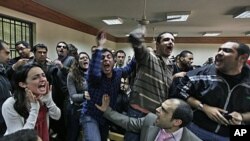Political tensions between Egypt and the United States appear to be easing, after Egypt lifted a travel ban on seven American democracy activists. Economic considerations appear to have been key to the resolution.
Whatever political gains Egypt's leaders may have sought to reap from a wave of anti-Americanism seems to have come up against a hard economic reckoning.
U.S. officials had vowed to cut off aid to Egypt after seven Americans in Cairo, part of a larger group of democracy activists, were accused of conducting illegal operations and barred from leaving the country.
This week, Egypt backed away from the case, with officials first postponing the trial until April, then lifting the travel ban on Wednesday. U.S. Secretary of State Hillary Clinton said she expects the case to be resolved soon.
The re-balancing reflects practical needs on both sides. After more than 30 years, the U.S. alliance with Egypt remains a linchpin of its Middle East policies, even as it continues to raise concerns about Egypt's commitment to democracy. For Egypt, one year after a popular uprising threw off the old leaders, the new ones are struggling with an economy thrown off kilter.
“Egypt needs an influx of cash as soon as possible," said Amira Ahmed, the business editor at Egypt Daily News. "There's a widening budget deficit and the foreign reserves are depleting. They've gone down to $16 billion and it needs this money, an infusion of money, as soon as possible.”
The United States provides $1.6 billion in annual aid to Egypt - part of its reward for signing a peace treaty with Israel in 1979. Most - $1.3 billion - goes to the military and much of that is slotted to buy American equipment. How little is seen by the average Egyptian is reflected in a recent Gallup poll suggesting a majority does not want further U.S. aid.
At the same time, Egypt's military rulers are facing increasing protests against the slow hand-over to civilian rule, criticism that some observers say they deflected by pointing to a “foreign hand” as responsible for Egypt's ills. Political observers said the trial of democracy activists appeared part of the campaign of distraction, by way of appealing to national pride.
The executive director of the Egyptian Center for Economic Studies, Magda Kandil, says the structure of the aid played into the calculation.
“Had people felt the appreciation for the aid, they probably would not have waved their hands and said 'So what?,” said Kandil.
Kandil argues for a restructuring of U.S. assistance. But she also thinks there was a certain ignorance on the part of people who were willing to give it up. U.S. help to Egypt during its period of transition is broader than the annual aid package: Kandil notes discussions of debt cancellation and talks between Washington and Cairo on revamping economic ties to expand investment and strengthen trade relations.
The willingness to risk foreign aid was seen earlier in the transition, with the ruling military council last year rejecting a $3.2 billion line of credit from the International Monetary Fund - a move that also appealed to national dignity.
But as business editor Ahmed points out, by January with the government floundering in efforts to provide basic services and unemployment soaring, leaders reversed course and the IMF loan came back in play.
Economist Kandil believes the implications of both the U.S. and IMF packages were too important to ignore. Other groups including the European Union, the World Bank and the African Development Bank, have been waiting for those deals to go through before committing money of their own.
“I think in both those cases it's about a lack of information about the economic reality and about the need to have the IMF money, not just for the value of the loan, but also to provide the seal of approval. Because continuing on the same path that we have had over the past year is very, very problematic,” said Kandil.
Discussions on both aid packages and the others that could follow, continue.
News
In Egypt NGO Case, Economic Reality Appears to Trump Politics




